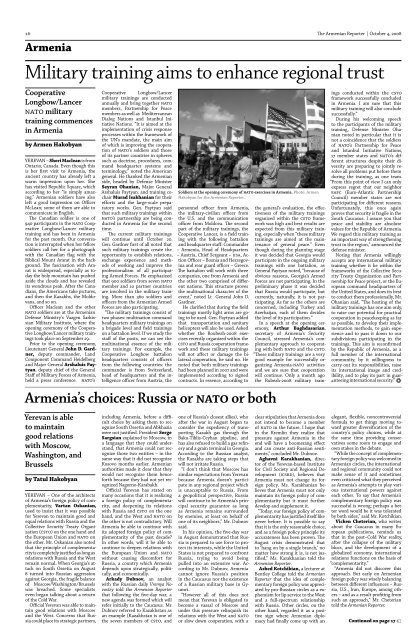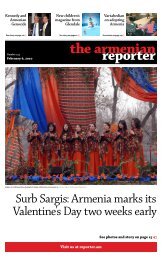National, International, Armenia, and Community News and Opinion
National, International, Armenia, and Community News and Opinion
National, International, Armenia, and Community News and Opinion
Create successful ePaper yourself
Turn your PDF publications into a flip-book with our unique Google optimized e-Paper software.
16 The <strong>Armenia</strong>n Reporter | October 4, 2008<br />
<strong>Armenia</strong><br />
Military training aims to enhance regional trust<br />
Cooperative<br />
Longbow/Lancer<br />
NATO military<br />
training commences<br />
in <strong>Armenia</strong><br />
by Armen Hakobyan<br />
YEREVAN – Sheri Maclean is from<br />
Ontario, Canada. Even though this<br />
is her first visit to <strong>Armenia</strong>, the<br />
ancient country has already left a<br />
warm impression upon her. She<br />
has visited Republic Square, which<br />
according to her “is simply amazing.”<br />
<strong>Armenia</strong>n soldiers have also<br />
left a good impression on Officer<br />
McLean; some of them are able to<br />
communicate in English.<br />
The Canadian soldier is one of<br />
940 participants in the NATO Cooperative<br />
Longbow/Lancer military<br />
training <strong>and</strong> has been in <strong>Armenia</strong><br />
for the past month. Our conversation<br />
is interrupted when her fellow<br />
soldiers call her for a photograph<br />
with the Canadian flag with the<br />
Biblical Mount Ararat in the background.<br />
The fascination with Ararat<br />
is widespread, especially as today<br />
the holy mountain has pushed<br />
aside the clouds <strong>and</strong> has revealed<br />
its wondrous peak. After the Canadians,<br />
the Americans take pictures,<br />
<strong>and</strong> then the Kazakhs, the Moldovans,<br />
<strong>and</strong> so on.<br />
Officer Maclean <strong>and</strong> the other<br />
NATO soldiers are at the <strong>Armenia</strong>n<br />
Defense Ministry’s Vazgen Sarkissian<br />
Military Institute, where the<br />
opening ceremony of the Cooperative<br />
Longbow/Lancer military trainings<br />
took place on September 29.<br />
Prior to the opening ceremony,<br />
Lieutenant General John D. Gardner,<br />
deputy comm<strong>and</strong>er, L<strong>and</strong><br />
Component Comm<strong>and</strong> Heidelberg<br />
<strong>and</strong> Major General Arshaluis Paytyan,<br />
deputy chief of the General<br />
Staff of Military Forces of <strong>Armenia</strong>,<br />
held a press conference. NATO’s<br />
<strong>Armenia</strong>’s choices: Russia or NATO or both<br />
Yerevan is able<br />
to maintain<br />
good relations<br />
with Moscow,<br />
Washington, <strong>and</strong><br />
Brussels<br />
by Tatul Hakobyan<br />
YEREVAN – One of the architects<br />
of <strong>Armenia</strong>’s foreign policy of complementarity,<br />
Vartan Oskanian,<br />
used to insist that it was possible<br />
for Yerevan to maintain good <strong>and</strong><br />
equal relations with Russia <strong>and</strong> the<br />
Collective Security Treaty Organization<br />
(CSTO) on the one h<strong>and</strong> <strong>and</strong><br />
the European Union <strong>and</strong> NATO on<br />
the other. Mr. Oskanian also noted<br />
that the principle of complementarity<br />
is completely justified as long as<br />
relations with Russia <strong>and</strong> the West<br />
remain normal. When Georgia’s attack<br />
on South Ossetia on August<br />
8 turned into Russian aggression<br />
against Georgia, the fragile balance<br />
of Moscow/Washington/Brussels<br />
was breached. Some specialists<br />
even began talking about a return<br />
of the Cold War.<br />
Official Yerevan was able to maintain<br />
good relations with Moscow<br />
<strong>and</strong> the West. Concerns that Russia<br />
could place its strategic partners,<br />
Cooperative Longbow/Lancer<br />
military trainings are conducted<br />
annually <strong>and</strong> bring together NATO<br />
members, Partnership for Peace<br />
members as well as Mediterranean<br />
Dialog Nations <strong>and</strong> Istanbul Initiative<br />
Nations. “It is aimed at the<br />
implementation of crisis response<br />
processes within the framework of<br />
the UN’s m<strong>and</strong>ate, the main aim<br />
of which is improving the cooperation<br />
of NATO’s soldiers <strong>and</strong> those<br />
of its partner countries in spheres<br />
such as doctrine, procedures, comm<strong>and</strong><br />
headquarter systems <strong>and</strong><br />
terminology,” noted the American<br />
general. He thanked the <strong>Armenia</strong>n<br />
side, headed by Defense Minister<br />
Seyran Ohanian, Major General<br />
Arshaluis Paytyan. <strong>and</strong> training cochair<br />
Murad Isakhanian for their<br />
efforts <strong>and</strong> the large-scale preparatory<br />
works. Gen. Paytyan said<br />
that such military trainings within<br />
NATO’s partnership are being conducted<br />
in <strong>Armenia</strong> for the second<br />
time.<br />
The current military trainings<br />
will continue until October 20.<br />
Gen. Gardner first of all noted that<br />
such military trainings create the<br />
opportunity to establish relations,<br />
exchange experience <strong>and</strong> methods<br />
of working <strong>and</strong> improve the<br />
professionalism of all participating<br />
Armed Forces. He emphasized<br />
that 900 soldiers from seven NATO<br />
member <strong>and</strong> 10 partner countries<br />
are involved in the military training.<br />
More than 360 soldiers <strong>and</strong><br />
officers from the <strong>Armenia</strong>n Armed<br />
Forces are also participating.<br />
“The military trainings consist of<br />
two phases: multination comm<strong>and</strong><br />
headquarters military trainings on<br />
a brigade level <strong>and</strong> field trainings<br />
on a battalion level. If we study the<br />
staff of the posts, we can see the<br />
multinational essence of the military<br />
trainings. For example, the<br />
Cooperative Longbow battalion<br />
headquarters consists of officers<br />
from the following countries: the<br />
comm<strong>and</strong>er is from Switzerl<strong>and</strong>,<br />
head of headquarters <strong>and</strong> the intelligence<br />
officer from Austria, the<br />
including <strong>Armenia</strong>, before a difficult<br />
choice by asking them to recognize<br />
South Ossetia <strong>and</strong> Abkhazia<br />
were not justified. President Serge<br />
Sargsian explained to Moscow, in<br />
a language that they could underst<strong>and</strong>,<br />
that <strong>Armenia</strong> could not recognize<br />
those two entities – in the<br />
same way that it did not recognize<br />
Kosovo months earlier. <strong>Armenia</strong>n<br />
authorities made it clear that they<br />
would not recognize them henceforth<br />
because they had not yet recognized<br />
Nagorno-Karabakh.<br />
Official Yerevan has stated on<br />
many occasions that it is realizing<br />
a foreign policy of complementarity,<br />
<strong>and</strong> deepening its relations<br />
with Russia <strong>and</strong> CSTO on the one<br />
h<strong>and</strong>, <strong>and</strong> the West <strong>and</strong> NATO on<br />
the other is not contradictory. Will<br />
<strong>Armenia</strong> be able to continue with<br />
its adopted foreign policy of complementarity<br />
of the past decade<br />
In other words, will it be able to<br />
continue to deepen relations with<br />
the European Union <strong>and</strong> NATO<br />
without causing discomfort for<br />
Russia, a country which <strong>Armenia</strong><br />
depends upon strategically, politically,<br />
<strong>and</strong> economically.<br />
Arkady Dubnov, an analyst<br />
with the Russian daily Vremya Novostey<br />
told the <strong>Armenia</strong>n Reporter<br />
that following the five-day war, a<br />
new agenda was formed which will<br />
refer initially to the Caucasus. Mr.<br />
Dubnov referred to Kazakhstan as<br />
an example (Kazakhstan is one of<br />
the seven members of CSTO, <strong>and</strong><br />
Soldiers at the opening ceremony of NATO exercises in <strong>Armenia</strong>. Photo: Armen<br />
Hakobyan for the <strong>Armenia</strong>n Reporter..<br />
personnel officer from <strong>Armenia</strong>,<br />
the military-civilian officer from<br />
the U.S. <strong>and</strong> the communication<br />
officer from Moldova. The second<br />
part of the military trainings, the<br />
Cooperative Lancer, is a field training<br />
with the following battalion<br />
<strong>and</strong> headquarter staff: Comm<strong>and</strong>er<br />
– <strong>Armenia</strong>, Head of Headquarters<br />
– Austria, Chief Sergeant – USA, Action<br />
Officer – Bosnia <strong>and</strong> Herzegovina<br />
<strong>and</strong> rear guard officer – Greece.<br />
The battalion will work with three<br />
companies, one from <strong>Armenia</strong> <strong>and</strong><br />
the other two comprised of different<br />
nations. This structure proves<br />
the multinational character of the<br />
event,” noted Lt General John D.<br />
Gardner.<br />
He clarified that during the field<br />
trainings mostly light arms are going<br />
to be used. Gen. Paytyan added<br />
that transportation <strong>and</strong> sanitary<br />
helicopters will also be used. Asked<br />
whether the Roubezh-2008 exercises<br />
recently organized within the<br />
CSTO <strong>and</strong> Russia cooperation framework<br />
<strong>and</strong> these military trainings<br />
will not affect or damage the bilateral<br />
cooperation, he said no. He<br />
noted that both military trainings<br />
had been planned in 2007 <strong>and</strong> were<br />
implemented according to signed<br />
contracts. In essence, according to<br />
one of Russia’s closest allies), who<br />
after the war in August began to<br />
consider the expediency of transporting<br />
Kazakh gas through the<br />
Baku-Tiblis-Ceyhan pipeline, <strong>and</strong><br />
has also refused to build a gas refinery<br />
<strong>and</strong> a grain terminal in Georgia.<br />
According to the Russian analyst,<br />
the Kazakhs are taking steps that<br />
will not irritate Russia.<br />
“I don’t think that Moscow has<br />
similar expectations from Yerevan<br />
because <strong>Armenia</strong> doesn’t participate<br />
in any regional project which<br />
is unacceptable to Russia. From<br />
a geopolitical perspective, Russia<br />
will continue to be <strong>Armenia</strong>’s principal<br />
security guarantor as long<br />
as <strong>Armenia</strong> remains surrounded<br />
by enemies, at least on behalf of<br />
one of its neighbors,” Mr. Dubnov<br />
said.<br />
In his opinion, the five-day war<br />
in August demonstrated that Russia<br />
is prepared to use force to protect<br />
its interests, while the United<br />
States is not prepared to confront<br />
Russia, trying to avoid being<br />
pulled into an extensive war. According<br />
to Mr. Dubnov, <strong>Armenia</strong><br />
cannot ignore Russia’s position<br />
in the Caucasus nor the existence<br />
of a Russian military base in Gyumri.<br />
“However all of this does not<br />
mean that Yerevan is obligated to<br />
become a vassal of Moscow <strong>and</strong><br />
under this pressure relinquish its<br />
relations with the West <strong>and</strong> NATO<br />
or slow down cooperation, with a<br />
clear stipulation that <strong>Armenia</strong> does<br />
not intend to become a member<br />
of NATO in the future. I hope that<br />
in the Kremlin they realize that<br />
pressure against <strong>Armenia</strong> in the<br />
end will have a boomerang effect<br />
<strong>and</strong> can create anti-Russian sentiments,”<br />
concluded Mr. Dubnov.<br />
Aghavni Karakhanian, director<br />
of the Yerevan-based Institute<br />
for Civil Society <strong>and</strong> Regional Development<br />
(ICSRD), believes that<br />
<strong>Armenia</strong> must not change its foreign<br />
policy. Ms. Karakhanian believes<br />
that <strong>Armenia</strong> must not only<br />
maintain its foreign policy of complementarity<br />
but it must further<br />
develop <strong>and</strong> supplement it.<br />
“Today, our foreign policy of complementarity<br />
has justified itself like<br />
never before. It is possible to say<br />
that it is the only reasonable choice,<br />
<strong>and</strong> as a foreign policy principle its<br />
accurateness has been proven. The<br />
August crisis demonstrated that<br />
to ‘hang on by a single branch,’ no<br />
matter how strong it is, is not justified,”<br />
Ms. Karakhanian told the<br />
<strong>Armenia</strong>n Reporter.<br />
Asbed Kotchikian, a lecturer at<br />
Bentley College told the <strong>Armenia</strong>n<br />
Reporter that the idea of complementary<br />
foreign policy was appreciated<br />
by pro-Russian circles as a euphemism<br />
for lip service to the West<br />
<strong>and</strong> a full-spectrum relationship<br />
with Russia. Other circles, on the<br />
other h<strong>and</strong>, regarded it as a positive<br />
sign where <strong>Armenia</strong>n diplomacy<br />
had finally come up with an<br />
the general’s evaluation, the effectiveness<br />
of the military trainings<br />
organized within the CSTO framework<br />
was high <strong>and</strong> best results are<br />
expected from this military training,<br />
especially when “these military<br />
trainings are aimed at the maintenance<br />
of general peace.” Even<br />
though during the planning stage<br />
it was decided that Georgia would<br />
participate in the ongoing military<br />
trainings with one battalion, as<br />
General Paytyan noted, “because of<br />
obvious reasons, Georgia’s Armed<br />
Forces are not participating. In the<br />
preliminary phase it was decided<br />
that Russia would participate, but<br />
currently, naturally, it is not participating.<br />
As far as the others are<br />
concerned, including Turkey <strong>and</strong><br />
Azerbaijan, each of them decides<br />
the level of its participation.”<br />
In a speech at the opening ceremony,<br />
Arthur Baghdasarian,<br />
secretary of <strong>Armenia</strong>’s Security<br />
Council, stressed <strong>Armenia</strong>’s complementary<br />
approach to cooperating<br />
with both NATO <strong>and</strong> the CSTO.<br />
“These military trainings are a very<br />
good example for successfully organizing<br />
<strong>Armenia</strong>-NATO activities<br />
<strong>and</strong> we are sure that cooperation<br />
will continue. Only a month ago<br />
the Rubezh-2008 military trainings<br />
conducted within the CSTO<br />
framework successfully concluded<br />
in <strong>Armenia</strong>. I am sure that this<br />
military training will also conclude<br />
successfully.”<br />
During his welcoming speech<br />
to the participants of the military<br />
training, Defense Minister Ohanian<br />
noted in particular that it is<br />
not a coincidence that the soldiers<br />
of NATO’s Partnership for Peace<br />
<strong>and</strong> Istanbul Initiative Nations,<br />
17 member states <strong>and</strong> NATO’s different<br />
structures despite their diversity<br />
are preparing to jointly resolve<br />
all problems put before them<br />
during the training, as one team.<br />
“From this point of view I can only<br />
express regret that our neighbor<br />
EAPC (Euro-Atlantic Partnership<br />
Council) member states are not<br />
participating for different reasons.<br />
Unfortunately, this once again<br />
proves that security is fragile in the<br />
South Caucasus. I assure you that<br />
peace <strong>and</strong> stability are absolute<br />
values for the Republic of <strong>Armenia</strong>.<br />
We regard this military training as<br />
an important way of strengthening<br />
trust in the region,” announced the<br />
defense minister.<br />
Noting that <strong>Armenia</strong> willingly<br />
accepts any international military<br />
training whether it be within the<br />
frameworks of the Collective Security<br />
Treaty Organization <strong>and</strong> Partnership<br />
for Peace project, or the European<br />
comm<strong>and</strong> headquarters of<br />
the United States, <strong>and</strong> does its best<br />
to conduct them professionally, Mr.<br />
Ohanian said, “The hosting of the<br />
military trainings has one aim only,<br />
to raise our potential for practical<br />
cooperation in peacekeeping as far<br />
as possible, to develop their implementation<br />
methods, to gain experience<br />
<strong>and</strong> to pass it down to our<br />
subdivisions participating in the<br />
trainings. This aim is reconfirmed<br />
by the Republic of <strong>Armenia</strong>, as a<br />
full member of the international<br />
community, by it willingness to<br />
carry out its responsibilities, raise<br />
its international image <strong>and</strong> credibility,<br />
<strong>and</strong> to play its part in guaranteeing<br />
international security.” f<br />
elegant, flexible, noncontroversial<br />
formula to get things moving toward<br />
greater diversification of the<br />
country’s policy choices, while at<br />
the same time providing conservatives<br />
some room to engage <strong>and</strong><br />
own stakes in the debate.<br />
“While the concept of complementary<br />
foreign policy was welcomed in<br />
<strong>Armenia</strong>n circles, the international<br />
<strong>and</strong> regional community could not<br />
make sense of it <strong>and</strong> sometimes<br />
even criticized what they perceived<br />
as <strong>Armenia</strong>’s attempts to play various<br />
international powers against<br />
each other. To say that <strong>Armenia</strong>’s<br />
complementary foreign policy was<br />
successful is wrong; perhaps a better<br />
word would be it was tolerated<br />
by both sides,” said Mr. Kotchikian.<br />
Vicken Cheterian, who writes<br />
about the Caucasus in many European<br />
publications, reminds us<br />
that in the post–Cold War reality,<br />
after the collapse of the military<br />
blocs, <strong>and</strong> the development of a<br />
globalized economy, international<br />
relations functions on the basis of<br />
“complementarity.”<br />
“<strong>Armenia</strong> did not discover this<br />
approach. But early on <strong>Armenia</strong>n<br />
foreign policy was wisely balancing<br />
between different influences – Russia,<br />
U.S., Iran, Europe, among others<br />
– <strong>and</strong> as a result profiting from<br />
such an approach,” Mr. Cheterian<br />
told the <strong>Armenia</strong>n Reporter.<br />
Continued on page 17 m

















